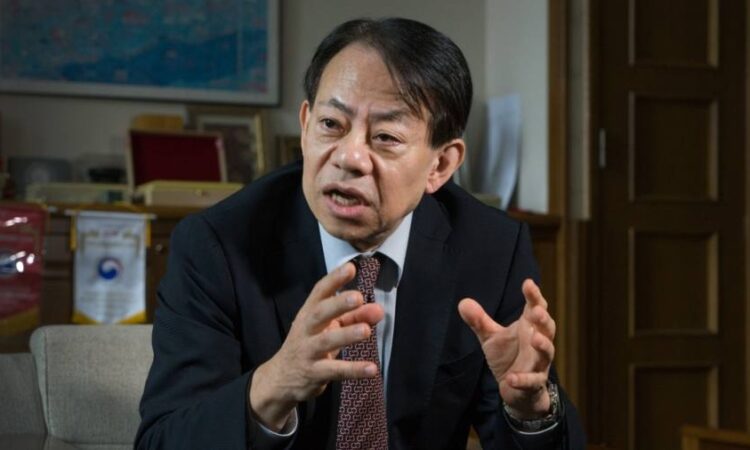
One of Asia’s most senior development bankers has urged countries to fight protectionism as US-China tensions threaten to undermine free trade, the region’s economic recovery and its battle against climate change.
Masatsugu Asakawa, president of the Manila-headquartered Asian Development Bank, said prolonged or intensified trade uncertainty between the world’s two biggest economies risked disrupting economic activity across the Asia-Pacific region, hitting consumer and business confidence around the world and reducing consumption.
“We need to continuously fight against any form of protectionism,” Asakawa told the Financial Times. “Trade fracturing is also a long-term concern. Increasing efforts to be self-reliant on supply chains might be prioritised over pressing concerns, such as the transition to net zero [emissions].”
The warning comes as US-China relations have reached their lowest point since the countries normalised diplomatic ties in 1979.
US president Joe Biden has deepened sweeping trade and investment policy changes designed to boost American jobs and manufacturing while keeping Chinese companies off US soil, including enacting $370bn of subsidies for clean energy industries. Similar moves are being drawn up in Europe.
China, too, has weaponised trade and used economic coercion to punish countries including Australia, Canada and South Korea over political disputes.
Asakawa said that while the US and China were “important stakeholders”, geopolitical tensions were destabilising for the Asia-Pacific region.
“Long experience has shown that political stability and security are the basis for peace, development and prosperity everywhere,” he said. “We do hope for an Asia-Pacific region that is more prosperous, inclusive, green and sustainable — peace is a vital foundation for this.
“Covid-19 reminds us that the world is highly interconnected. And what we need now is redouble our co-operation and reaffirm the benefits arising from open trade and investment regimes,” Asakawa added.
The bank forecasts regional growth of 4.8 per cent this year, up from 4.2 per cent in 2022, driven in part by China’s economy recovering after slow growth under Xi Jinping’s zero-Covid controls, which were abandoned at the end of last year.
Despite the outlook, Asakawa cautioned against losing focus from multilateral efforts to combat global warming.
The bank will this week unveil a financing partnership facility aimed at better mobilising climate finance at scale through “leveraged climate finance”.
Under the facility, dubbed IF-CAP, the bank is inviting donors to guarantee a portfolio of sovereign loans issued by the ADB. The guarantees will be called upon if a borrowing member defaults. With donors sharing the default risk, the ADB said it could give it more lending headroom to fund climate action.
Asakawa said the bank, which is trying to spur $100bn in climate funding in the region, expected IF-CAP to lead to $1 of guarantees unlocking $5 of new climate loans.
He also pointed to the need to tackle food insecurity and hunger in debt-laden countries such as Bangladesh, Pakistan and Sri Lanka.
“Even one year before the Russian invasion of Ukraine, 425mn people in our region were affected by hunger,” he said, noting that the ADB in September announced a $14bn package targeting food insecurity.





